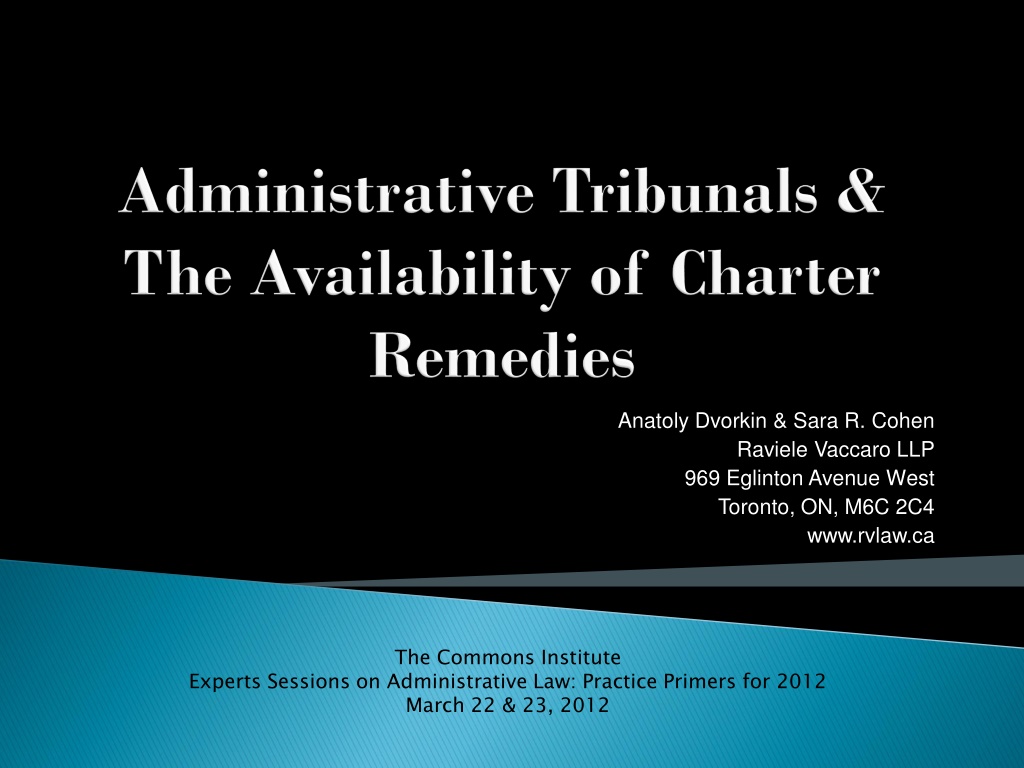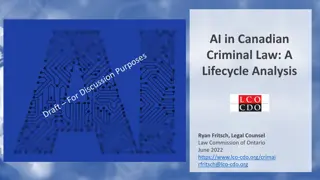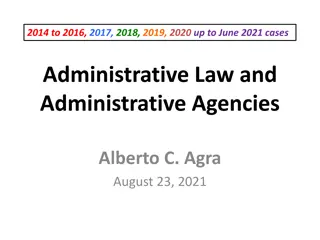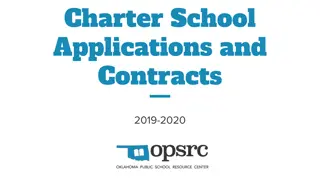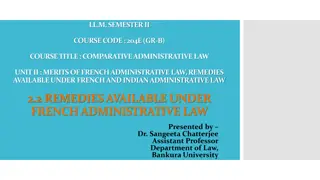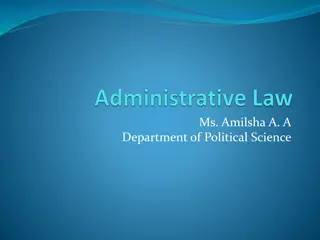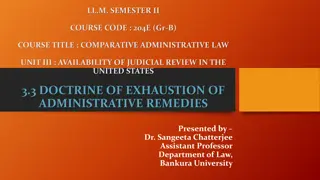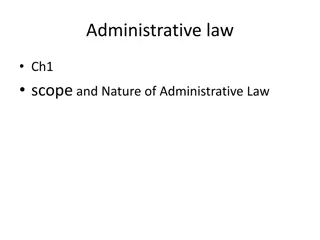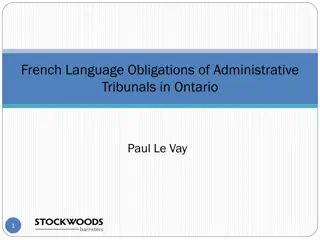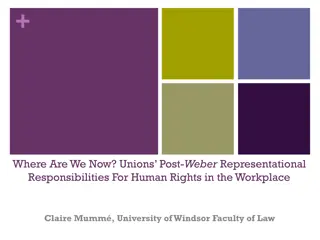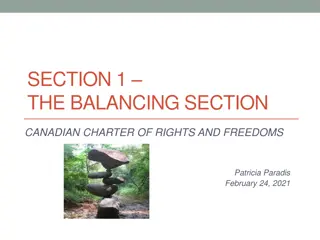Understanding Tribunals, Charter Rights, and Remedies in Canadian Administrative Law
Exploring the implications of Section 52(1) of the Constitution Act and Section 24(1) of the Charter on administrative law in Canada. Discussing how tribunals handle potential constitutional issues, provide personal remedies, and analyze the impacts of legal decisions. Dive into the complexities of constitutional law applications within the realm of administrative tribunals.
Download Presentation

Please find below an Image/Link to download the presentation.
The content on the website is provided AS IS for your information and personal use only. It may not be sold, licensed, or shared on other websites without obtaining consent from the author. Download presentation by click this link. If you encounter any issues during the download, it is possible that the publisher has removed the file from their server.
E N D
Presentation Transcript
Anatoly Dvorkin & Sara R. Cohen Raviele Vaccaro LLP 969 Eglinton Avenue West Toronto, ON, M6C 2C4 www.rvlaw.ca The Commons Institute Experts Sessions on Administrative Law: Practice Primers for 2012 March 22 & 23, 2012
Tribunals and the Charter pre R. v. Conway Section 52(1) of the Constitution Act Section 24(1) of the Charter R. v. Conway The Decision How the law changed? The Impact Potential problems Recent Tribunal Decisions and the Application of Conway Practice Tips
Section 52(1) of the Constitution Act The Constitution of Canada is the supreme law of Canada, and any law that is inconsistent with the provisions of the Constitution is, to the extent of the inconsistency, of no force or effect. Section 24(1) of the Charter Anyone whose rights or freedoms, as guaranteed by this Charter, have been infringed or denied, may apply to a court of competent jurisdiction to obtain such remedy as the court considers appropriate and just in the circumstances
If an applicant submitted that the tribunal should find a legislative provision constitutionally invalid or inapplicable If an applicant requested that the tribunal provide a personal remedy basis that his/her Charter remedies had been infringed legislative provision constitutionally invalid or inapplicable personal remedy on the Charter remedies had been infringed Section 24(1) analysis applied Mills v. The Queen, [1986] 1 SCR 863 (S.C.C.) Section 52(1) analysis applied Nova Scotia (Workers Compensation Board) v. Martin, 2003 SCC 54 (S.C.C.)
when a law produces an unconstitutional effect, the usual remedy lies under s. 52(1) Section 24(1), by contrast, is generally used as a remedy, not for unconstitutional laws, but for unconstitutional government acts committed under the authority of legal regimes which are accepted as fully unconstitutional (paras. 59-60)
The Martin Test (under s. 52): Does the administrative tribunal have jurisdiction, explicit or implied, to decide questions of law? Applying only valid laws Explicit jurisdiction is found in the enabling legislation Implied jurisdiction requires examination of statute as a whole If so, presumption that tribunal has jurisdiction Has the presumption been rebutted? An explicit withdrawal of authority; or An examination of the statutory scheme clearly leads to conclusion that the legislature intended to exclude the Charter from the scope of the questions of law to be addressed by the tribunal
The Mills Test (s.24): Mills was a 1986 decision by the SCC that found that a preliminary inquiry judge was a court of competent jurisidiction A court of competent jurisdiction must possess: 1. jurisdiction over the person; 2. Jurisdiction over the subject matter; and 3. Jurisdiction to grant the remedy sought In 1995, Weber v. Ontario Hydro (SCC) held that the Mills test applied to administrative tribunals as well
The 3rd part of the test determinative was determinative in most cases 3rd part whether tribunal has power to grant a particular remedy A functional and structural analysis Examine the function of the tribunal Examine the structure
Background: 1984: Mr. Conway found not guilty of sexual assault with a weapon by reason of insanity 2006: ORB s annual review of Mr. Conway s detention Mr. Conway asked the ORB to exercise its statutory powers to impose conditions on his detention at CAMH and applied for s. 24 Charter remedy for alleged breach of rights absolute discharge ORB declined to hear Charter application because not a court of competent jurisdiction
Appealed on 2 grounds: ORB erred by making mere suggestions to CAMH rather than imposing conditions C of A unanimously agreed ORB erred ORB erred in holding that not a court of competent jurisdiction C of A split: Majority: ORB not court of competent jurisdiction wrt remedy of absolute discharge Minority (Lang J.A.) nature of remedy sought ought not be construed in unduly narrow manner
Abella J. widely framed issue: relationship between the Charter, its remedial provisions and administrative tribunals Review of history of jurisdiction of administrative tribunals: Mills whether court of competent jurisdiction under s. 24(1) Slaight Communications exercise of statutory discretion is subject to Charter and Charter values Cuddy Chicks trilogy specialized tribunals with expertise and authority to decide questions of law are in best position to hear and decide constitutional questions related to their statutory mandate (this formed the underpinning for Martin test)
2 part test to determine whether administrative tribunal can apply Charter: Part I: does the tribunal have jurisdiction, explicit or implicit, to decide questions of law unless it is clearly demonstrated that the legislature intended to exclude the Charter from the tribunal s jurisdiction, the tribunal = court of competent jurisdiction and can apply Charter and Charter remedies when resolving matters properly before it [para. 81]; questions of law? If it does, and
If yes to Part I, then the remaining question is whether the tribunal can grant the particular remedy sought relevant statutory scheme. Answering this question is necessarily an exercise in discerning legislative intent is whether the remedy sought is the kind of remedy that the legislature intended would fit within the statutory framework of the particular tribunal. [para 82] whether the tribunal can grant the particular remedy sought, given the legislative intent. On this approach, what will always be at issue
Part I = similar to Martin (s. 52) Part II = similar to Mills Conway test
SCC disagreed that s. 24 of Charter freed ORB from statutory limits on its jurisdiction frustrate board s mandate and would contradict Parliament s intention Tribunals can vindicate Charter rights by exercising regular statutory powers and processes in ways that are in line with Charter values
[101] A finding that the Board is entitled to grant Mr. Conway an absolute discharge despite its conclusion that he is a significant threat to public safety, or to direct CAMH to provide him with a particular treatment, would be a clear contradiction of Parliament s intent. Given the statutory scheme and the constitutional considerations, the Board cannot grant these remedies to Mr. Conway.
In Conway, the decision that ORB could not grant the charter remedy sought hinged on the following: Criminal Code, the statutory scheme under which the ORB operates, does not permit an absolute discharge in circumstances where the accused continues to pose a significant threat to the safety of the public
Tribunals to play primary role in determining Charter issues falling within their jurisdiction Most important inquiry = whether tribunal can consider questions of law (remedy = secondary concern) Charter values (instead of Charter rights) Investigative vs. adjudicative tribunals Remedies available to tribunal Charter doesn t enhance powers of tribunal; remedy must be one available to tribunal itself Conway doesn t change that tribunals do not have authority to grant declarations of constitutional invalidity
Cant apply Charter remedies because can t decide questions of law Can decide questions of law and Charter applications, but can t provide remedy sought Can decide questions of law but Charter excluded How have tribunals applied Conway? Can decide questions of law, apply Charter and can provide remedy sought
Health Services Appeal and Review Board Part of remedy sought was finding that s. 6(3) of MHARBA contrary to Charter and of no effect s. 6.(3) of Ministry of Health and Long-Term Care Appeal and Review Board s Act, 1998, S.O. 1998 does not allow the Board to even inquire into the constitutional validity of an Act or Regulation Enacting statutory provisions specifically prohibit analysis Needs to be answered in another forum
Most post-Conway decisions have held that tribunals have jurisdiction to hear Charter or constitutional arguments
Argument that Hellenic society was unconstitutional based on discrimination re ancestry, ethnicity HRTO has jurisdiction to decide questions of law and therefore can apply Charter However, the specific remedy being sought was against legislative intent specifically dealt with in section 18 of Human Rights Code
LSUC hearing panel held that it certainly has jurisdiction to make findings of law, and has power to decide constitutional issues BUT notes that in Conway, cannot declare any part of an Act invalid Candidate was seeking remedy re governance of LSUC as a whole panel declined, finding such a matter more appropriately dealt with before court of original jurisdiction
Relying on Conway, held that Discipline Committee of CPSO has jurisdiction to determine Charter issues [184] The effect of Conway is that an administrative tribunal with the authority to apply s. 52 of the Constitution Act, 1982 will also have the authority to grant remedies under s. 24(1) of the Charter. The only limit to this power is if the remedy sought is not the kind of remedy that the Legislature intended the tribunal to grant. Div. Ct. declined to interfere with findings of tribunal
Ontario Information and Privacy Commission held that it had jurisdiction to determine constitutional arguments Quoted para. 78 Conway, administrative tribunals with the power to decide questions of law, and from whom constitutional jurisdiction has not been clearly withdrawn, have the authority to resolve constitutional questions that are linked to matters properly before them.
Examples of tribunals that have explicitly held (or it has been held) that they can address Charter issues: ORB (Conway, SCC) Discipline Committee of CPSO (Sazant, Div. Ct.) Ontario Information and Privacy Commission (Port Hope) Immigration Divison Board (Stables, Federal Court) Child and Family Services Review Board (S.I. v. Youthdale) Law Society Hearing Panel (Kopyto) Human Rights Tribunal of Ontario (Kostiuk) Durham Regional Police Services Board (J.N. v. Durham Regional Police Service, Ont. SCJ) Examples of tribunals that have explicitly held that they cannot address Charter issues:iss Health Services Appeal Review Board (E.H.)
If you think there is a Charter or constitutional argument to be made make it at the Tribunal level See Stables case Consider seeking Charter remedy, or, further and in the alternative, a remedy in line with Charter values Remember that tribunal cannot grant declaration of invalidity, only can choose not to enforce or apply BUT Charter challenge made to tribunal considerably more expeditious, less time consuming and less expensive
Please feel free to direct any follow up questions to either: Anatoly Dvorkin at anatoly@rvlaw.ca or @DvorkinLaw; or Sara R. Cohen at sara@rvlaw.ca or @fertilitylaw
